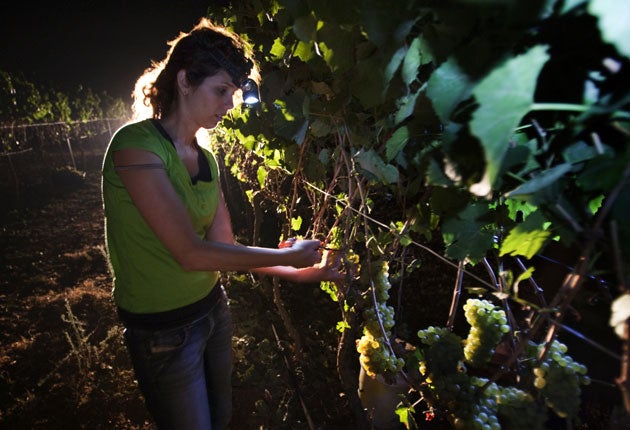Playing music to wine really makes it sing
Or so says an Austrian inventor. Scientists scoff, but his idea is one among many being adopted by vineyards around the world

If one Austrian's quirky idea catches on, wine tastings could soon sound like this: Is that some Mozart in my glass? A hint of Haydn, maybe?
Convinced that music is a key ingredient for a good bottle of red or white, Markus Bachmann has invented a special speaker that exposes fermenting grape juice to classical, jazz or electronic tunes. The sound waves, he claims, influence the maturing process and produce a better-tasting wine.
This is the latest in a slew of weird ways to make wine, some of which also have a melodic touch. Take Portuguese winery Jose Maria da Fonseca, which plays classical music in its century-old Adega da Mata barrel hall, where it ages its well-known Periquita label wines. Or French company Henri Maire, which has sent thousands of bottles of red wine sailing around the world in ships to be jostled by waves. Then there's Austrian Rainer Christ, who swears by full-moon grape harvesting, saying it makes his wine more complex and gives it a longer shelf-life.
Scientists scoff at such methods, calling them at best harmless, at worst cynical marketing ploys. Werner Gruber, a University of Vienna physicist and member of a group known as the Science Busters, which aims to debunk false scientific claims, rejected Mr Bachmann's idea as "rubbish". "Yeast, fungi, don't have opinions," he said. "They really don't care if AC/DC, Madonna or Mozart is played to them."
Mr Bachmann is undeterred, insisting his invention will be the next big thing in winemaking. But he is highly protective of his sound-infusing gadget, refusing to have the small, baby blue, UFO-shaped object filmed or photographed.
He jokingly calls it a "swimming saucer" and will only say that it weighs 1.4kg (3.1lbs) and is inserted into the fermenting grape juice to stimulate the yeast. "The wines get more fruity, they get mature earlier," he said in a recent interview. "All the flavour stand alone much better." Mr Bachmann theorises that the sound waves from his speaker move yeast particles around, causing them to eat greater amounts of sugar, resulting in a wine that has a lower sugar content. "There's an absolute scientific basis for it," he said.
Florian Bauer, professor of wine biotechnology at South Africa's Stellenbosch University, said sound waves, including ultrasounds, have an impact on molecules, so may accelerate chemical processes. But he said he is unaware of any established science that music makes wine better. "Will it improve wine? As always with wine, sometimes, possibly yes, mostly, probably not," he said.
Mr Bachmann has teamed up with six Austrian wine growers, and an initial 31,000 litres of so-called Sonor Wines, priced at between ¤19 and ¤25 (£16-£21), will go on sale soon. They include a 2010 pinot blanc infused with Mozart's 41st Symphony and a 2010 zweigelt exposed to a selection of arias. Franz-Michael Mayer, a winemaker who works with Mr Bachmann, played some waltzes and polkas performed by the Vienna Philharmonic Orchestra into his semillon wine for about three weeks. "I get the sense it tastes different, good," Mr Mayer said, as he relished a sip. "I'm so convinced that I'm ready to continue next year."
Other wine growers, such as Mr Christ, are keeping an open mind. "Time will tell if there's really something to it," he said. "If it turns out not to have a lasting positive effect, at least it was a nice try."
Some drinks producers have been using music for a while. Hector Vasquez of the Mexican Los Danzantes distillery produces mezcal, an alcoholic drink made from maguey plants, to both classical and folk tunes. "I can't promise that this method, that these beliefs, work, but we're turning it into a good method, and I'm sure that in the three years we have been doing it, it hasn't hurt the fermentation process," he said, adding that his favourites are Schubert, Chopin and sometimes Rachmaninov.
Then there's South Africa's DeMorgenzon winery, which plays baroque music 24 hours a day to its vines and wines through speakers placed in its vineyard and cellar.
Join our commenting forum
Join thought-provoking conversations, follow other Independent readers and see their replies
Comments
Bookmark popover
Removed from bookmarks